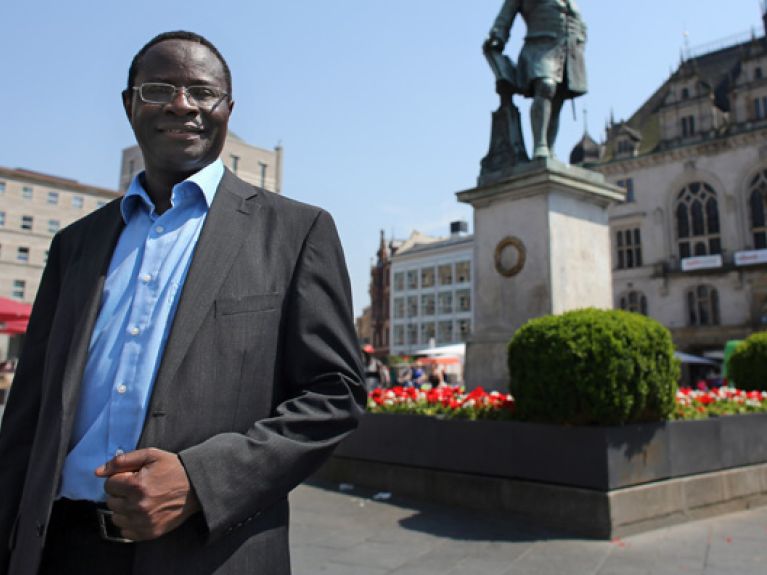“Integration is a cross-cutting theme“
Karamba Diaby, a German politician born in Senegal, talks about the developing welcome culture in Germany.

Mr Diaby, Germany needs far more immigrants in the coming years, especially skilled personnel. Does the Federal Republic appeal to immigrants?
Yes, Germany does appeal to immigrants. The increasing numbers of students from abroad are a clear illustration of this. But we still face more tasks in order to reach our objective. The Federal Government has decided to foster a welcoming culture in Germany. This aim was set out in the Coalition Agreement. But a lot more structural changes are needed. This applies above all to the immigration authorities, but also to the German consular sections abroad.
What is your idea of a ‘welcoming culture’?
To me a welcoming culture means that people are made to feel welcome in Germany. We have to give children who have been born and raised here the feeling that they belong. It is also important that we employ more immigrants in the civil service. At the moment only 8 to 10 per cent of people with a migrant background work in this area. Something needs to be done about this.
For many people, their first contacts are with the immigration authorities, and they have negative experiences. Why?
Unfortunately, there is a lack of intercultural competence in many immigration offices. I don’t expect them to speak every language in the world, but some of their colleagues should be able to speak the major languages of their clients.
Countries, such as Canada, have had a culture of welcome for a long time. Why is Germany lagging behind?
It’s because we in Germany have taken a long time to accept that we are an immigration country. It was not until 2002 that a change in perspective came with the red-greed coalition’s new Immigration Act. Up until then people usually referred to around six million foreigners in Germany. But nowadays references are made to around 16 million people with a migration background. We’re on the right track, but we still have a long way to go.
Are there differences between eastern and western Germany? You are a Member of the Bundestag for the eastern German constituency of Halle/Saale. Does more need to be done there than in the west?
Quite the opposite. I think that over the past 20 years modern structures have been created in eastern Germany. We are well positioned in Halle/Saale and work very professionally. In my constituency four to five per cent of the people have a migration background, and we have 19 organisations for migrants linked together in an integration network. Of course, there are fewer migrants living in eastern Germany, and sometimes there is a lack of everyday encounters and experiences. That’s why there are still some reservations in sections of society.
But many people with a migration background are actually afraid to go to eastern Germany. Is this just a cliché or a prejudice?
Yes, there is racism, and there are organised groups in certain areas. Right-wing extremism should not be played down. But right-wing extremism is a problem throughout Germany and in Europe. It is not restricted to eastern Germany. The region is not a centre of right-wing extremism. Look at me: I’ve been a member of Halle City Council since 2009, and the people have elected me with a good result into the federal parliament.
When you first took up your seat in the Bundestag, you were strongly focused on themes related to integration, but you consciously chose other areas of political emphasis. Do politicians with a migration background first have to overcome preconceived ideas in this respect?
It’s a well-known phenomenon. Women in politics often face such difficulties at first, because they’re expected to deal with women’s topics. Things are similar for people with a migration background. At first, people tried to put me in the integration pigeonhole. But I won through in the end. In today’s parliament I am a member of the Committee on Education, Research and Technology Assessment, vice chairman of the Committee on Human Rights and Humanitarian Aid and a member of the Subcommittee on Civic Engagement. Integration is a cross-cutting theme that occurs not only in the education committee but in the other areas too.
The immigration of qualified personnel is widely accepted. But there are also many refugees coming to Germany at the moment. Is it more difficult to foster acceptance within society in their case?
For one thing we have a lack of qualified personnel, and then we have refugees who leave their countries in an emergency. Refugees also include highly qualified people. I don’t have the impression that there’s a negative attitude towards refugees. But we need to give local authorities more support for refugee accommodation and provide the public with better information. This topic will be with us for a long time to come, because the crises in the world are increasing. ▪
Interview: Gemma Pörzgen
Karamba Diaby
At the age of 14 Karamba Diaby became politically active as a student representative in his native country of Senegal. He later campaigned at university for better study conditions in the African country. As a young man he won a scholarship to study in Halle/Saale in the former GDR. After reunification he gained his doctorate in chemistry, became involved in his new home town’s foreign residents’ council and in the SPD. His admiration for the former Federal Chancellor and party chairman Willy Brandt brought him to the Social Democrats. In 2001 he joined the Ministry of Labour and Social Affairs of the Land of Saxony-Anhalt as an expert with the Commissioner for Integration. In 2013 Karamba Diaby ran for the German Bundestag and his constituency elected him as their member of parliament.

